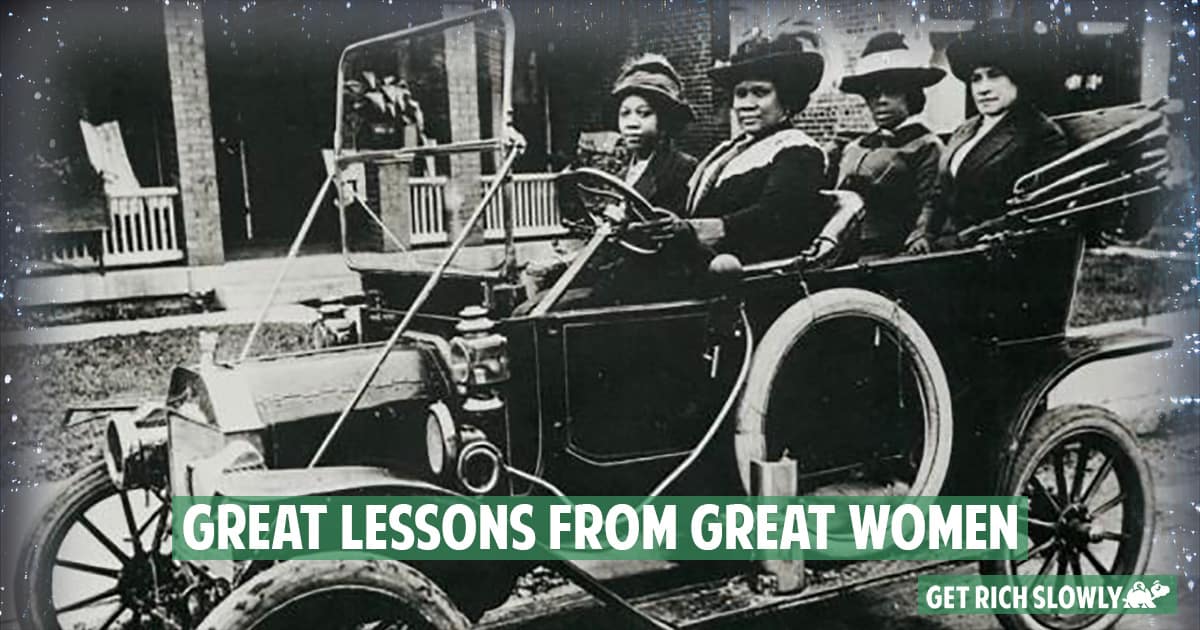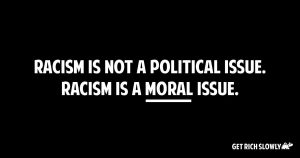A decade ago, J.D. shared some great lessons from great men. He had a wealth of material to draw from: biographies of historical figures from centuries ago, classic business texts, and the earliest self-help books.
If you want to compile lessons from great women, however, you don’t have the same sources, because women have not been considered “great” for much of history, and thus they’ve not been asked for their opinions on most things — certainly not financial matters! Multiply that times ten for women of color.
Today, I’d like to share some great lessons from great women. But the wisdom I’ve collected here comes primarily from media sources and speeches. It’s no less wise than the wisdom from books written by great men, and it applies to everyone of all genders, although it’s informed in many cases by much tougher life circumstances than the white men who lent their thoughts to this post’s counterpart.
Here are ten inspiring bits of wisdom that I’ve learned from great women.
Do the Work
“There are two kinds of people, those who do the work and those who take the credit. Try to be in the first group; there is less competition there.” – Indira Gandhi, India’s first (and only) female prime minister
We are trained to look for shortcuts in everything. More than that, we’re surrounded by people who want the glory and the money associated with having done something without actually doing the thing.
But real success – and with it a sense of true accomplishment and fulfillment – only comes if we actually do the work. Success without having done the work feels hollow. And the belief that success should come instantly and with glory puts us in the wrong mindset to achieve big things.
I’d tweak Indira’s quote just a little, though, to say that it’s fine to claim credit – in fact you should! – but only after you’ve actually done the work.
Work first, credit second.
Define Success for Yourself
“To me success means effectiveness in the world, that I am able to carry my ideas and values into the world — that I am able to change it in positive ways.” – Maxine Hong Kingston, author
Our society tends to have a one-dimensional definition of success: To be successful is to have power, status, and money. While those things might satisfy some of us, it’s simply not true that everyone will feel equally fulfilled by having them, never mind that our current economy simply won’t allow most people to achieve those things.
Instead, let’s follow Maxine’s advice and define success for ourselves. She defines it as effectiveness at carrying her ideas and values into the world, which is true for me, too, but you get to choose your own definition.
Mistakes Aren’t Failure
“You know, failure hurts. Any kind of failure stings. If you live in the sting, you will undoubtedly fail. My way of getting past the sting is to say no, ‘I’m just not going to let this get me down.’” – Sonia Sotomayor, the first Latina justice on the U.S. Supreme Court
“Failure is an important part of your growth and developing resilience. Don’t be afraid to fail.” – Michelle Obama
It’s natural to be afraid of failure. And despite the recent Silicon Valley-led trend of “failing fast” (in which failure is accepted but is also supposedly painless), Sonia and Michelle understand that failure sucks. There’s no point in sugar-coating it.
If you invest yourself in something and it doesn’t work out, it’s inevitable that that’s going to hurt. But what matters is what you do next. Do you wallow in that hurt? Or do you figure out what you can learn from that failure, and refuse to let it stop you?
Be like these great women and carry on, more resilient than ever.
Embrace Fear
“If your dreams do not scare you, they are not big enough.” – Ellen Johnson Sirleaf, President of Liberia and Nobel Peace Prize winner
Speaking of that fear of failure, not only can we not let failure stop of from moving forward, we can’t let the fear of it stop us from even trying in the first place.
Fear can be a helpful guide to tell us that we’re getting closer to our highest purpose, and to doing something that really matters. If you’re never scared by something you’re setting out to accomplish, it doesn’t mean that you’re especially brave. It means you’ve never challenged yourself.
Real Wealth Is Community
“My object in life is not simply to make money for myself.” – Madam C. J. Walker, the first self-made African-American millionaire
We don’t talk enough about the incredible life of Madam C.J. Walker, an entrepreneur who was determined to build her own wealth, but also to lift as she climbed and enrich others in her community along the way. Fortunately, you can now learn more about her in the Netflix series Self Made.
Walker grew up in terrible poverty, like most African-Americans of her day, and knew she wouldn’t be satisfied if she only enriched herself without making things better for her community. It’s a lesson we can all take to heart, asking how we can use our own opportunities and advantages to create opportunities for others, especially for those who’ve historically faced more barriers.
Generosity and an Abundance Mindset Will Serve You Well
“If you look at what you have in life, you’ll always have more. If you look at what you don’t have in life, you’ll never have enough.” – Oprah Winfrey
“No one has ever become poor by giving.” – Anne Frank
Something I wish I’d understood earlier in life is the destructive power of a scarcity mindset (in which you focus on what you don’t have and feel compelled to hoard money) rather than an abundance mindset (in which you focus on what you do have and therefore don’t need to hold on to it so tightly).
Psychological research tells us that giving of ourselves, both our time and money, makes us feel better about ourselves, more grateful for what we have, and happier overall. And that’s in addition to strengthening our communities and helping those less fortunate at the same time.
Generosity is a muscle you have to build, so start small if you have to, but give whenever you can.
Pursue the Things You Love Most
“You can only become truly accomplished at something you love. Don’t make money your goal. Instead, pursue the things you love doing, and then do them so well that people can’t take their eyes off you.” – Maya Angelou, author, poet, and civil rights activist
I actually kind of hate the “follow your passion” career advice that so many extol, because it’s simply not universally applicable, and it sets up an unhelpful divide between those who are able to go into a career path about which they’re passionate, and those who have to do the thankless jobs that we’re finally recognizing as essential in the era of COVID-19.
But your career is not the entirety of your existence. And in your life as a whole, I absolutely believe in letting what you love guide you, without regard for money.
Being accomplished at something doesn’t have to mean getting a paycheck to do it, nor does it require public recognition. It could be something you do privately for your own enjoyment and nothing else. And doing it without regard for money is an important piece, because we make decisions differently when we’re profit-motivated.
Allow yourself at least one thing you love in life in which money plays no part.
Claim Your Power
“Power is not given to you. You have to take it.” – Beyoncé
“We teach girls to shrink themselves, to make themselves smaller. We say to girls: You can have ambition, but not too much. You should aim to be successful but not too successful, otherwise you will threaten the man. If you are the breadwinner in your relationship with a man, pretend that you are not, especially in public, otherwise you will emasculate him.” – Chimamanda Ngozi, author and activist
“We as women should shine light on our accomplishments and not feel egotistical when we do. It’s a way to let the world know that we as women can accomplish great things!” – Dolores Huerta, founder of the United Farm Workers
“Women’s empowerment” is another idea I kind of hate, because it suggests we are being granted some small amount of power by those who already possess it, in the amounts they choose to grant.
But those in power never asked permission or waited patiently to be gifted what they felt was theirs. They didn’t shrink themselves to make others feel better about themselves. They didn’t hesitate to shout their accomplishments because of how it might make them look. They took that power and stood in it — without shame.
So, instead of “being empowered”, we should claim our own power. (And to those who’ve historically had those advantages, don’t worry – “power” isn’t a zero-sum game. More people having power doesn’t lessen your own.)
Use your voice, cheer your accomplishments, and live to your full potential.
People Are More Important Than Anything
“People first, then money, then things.” – Suze Orman
“Remember, ‘No one’s more important than people’! In other words, friendship is the most important thing—not career or housework, or one’s fatigue—and it needs to be tended and nurtured.” – Julia Child
We can argue about whether Suze Orman is a great woman or not, but she certainly expressed this sentiment most succinctly: People are the most important thing.
If your wealth or your success comes at the expense of your relationships, then all the money in the world won’t make you happy. And countless studies confirm this: Those with the strongest relationships live the longest and have the most high-quality-of-life years, they have the greatest sense of purpose, and they’re the happiest.
Put the people in your life first, ahead of your career and hustle, if you care about what your life adds up to and not just what your financial numbers add up to.
Know What You Stand For
“Stand for something or you will fall for anything. Today’s mighty oak is yesterday’s nut that held its ground.” – Rosa Parks, American civil rights activist
This may seem like it’s not a money lesson, but it absolutely is. We’re faced with scores of choices every day that have real-world implications for other people and the planet.
Let’s say you decide you want to earn passive income through rental real estate. Do you want to be a slum lord who does the bare minimum maintenance on your properties and evicts people the second rent is late? Or do you want to recognize that your property is someone’s home and maintain it accordingly, and cut them some slack if they have trouble paying?
Making no decision is a decision in itself, so make your choice consciously. Know what you stand for, and recognize that your money is the single biggest expression of your values.
Final thoughts: The women who gave us these lessons are a huge inspiration to me, and their fights for justice have paved the way for future generations to struggle less. Let’s carry their lessons into the world and do great things!






